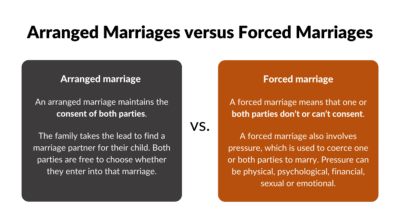Forced marriage refers to a marriage in which at least one person did not consent to the union. Tactics such as fear, guilt, fraud, or shaming are often used to coerce a person into marriage.
Sakhi provides support to anyone who has experienced forced marriage or is seeking more information on forced marriages.
If you or someone you know is being forced into a marriage, please contact Sakhi’s helpline at 212-868-6741 from Monday-Friday, 10am–10pm or text 1 (305)6972544, email
Sakhi’s Commitment to Addressing Forced Marriage
- We provide free, confidential support to individuals that are facing forced marriages either in the U.S. or overseas.
- Our services include safety planning, risk assessment and comprehensive case management support.
- Many minors possess limited knowledge and ability to advocate for themselves. Our casework and resources seek to support individuals in both building awareness of one’s rights and escaping forced marriage.
- We are leading the forced marriage national campaign in the U.S. and work closely with state partnerships to create a clear policy for supporting forced marriage survivors.
About Forced Marriage

Arranged marriage is not the same as forced marriage. Forced marriage occurs when one’s right to consent and refuse is violated. In an arranged marriage, there is always consent.
Who Does Forced Marriage Impact?
- Forced marriage impacts people from all religious, ethnic, and cultural backgrounds, national origins, and economic status.
- Forced marriage affects people of all ages, and those aged 15 to 25 are at higher risk of experiencing it.
- Forced marriage affects folks of all genders.
The Impacts of Forced Marriage
- Survivors of forced marriage often face emotional, physical, and psychological abuse, rape, and denial of education and opportunity.
- The long term effects for women can include rape, forced abortion, enforced pregnancy, serious mental health problems.
- Often occurs for reasons related to adhering to gender norms, money, immigration, status, etc.
Know the signs. Forced Marriage can involve:
- Emotional blackmail and pressure
- Isolation: survivors may miss school or have no contact with friends and family; often, their family may limit their social contacts or ability to socialize
- Economic threats: Economic threats like kicking an individual out of all financial sources and house, other cases withdraw the support in usa or visa.
- Threat of physical violence: may involve physical violence from family or partners.
- Stalking: partners or family members may surveil or follow the survivor when they leave home.
- Kidnapping: often, survivors are forced to travel to a parent’s home country. They may be manipulated into marriages while traveling for what they thought was vacation.
- Holding personal items: withholding passport, cell phone and credit cards overseas and forcing a survivor to get married.
Further Resources
- Tahirih Justice Center
- Sanctuary for Families
- The U.S. State Department
- The State Department is available to assist U.S. citizens that are victims of forced marriage with replacement of travel documents and return travel to the United States. For updated information and travel alerts, please visit the department’s webpage.
Contact the U.S Embassies in South Asia
- U.S Embassy in Pakistan
- Phone: +92-51-201-4000 or 5000
- Email:
- U.S. Embassy in Bangladesh
- Phone: +880 2-8855500
- Email:
- U.S Embassy in India:
- Phone: +91-11-2419-8000
- Outside of Office Hours, contact: +91-11-2419-8000
- Outside of India: 011-91-11-2419-8000
- Phone: +91-11-2419-8000
- U.S Embassy in Nepal
- Phone: +977 1-4234000
- Email:
- U.S Embassy in Afghanistan:
- Phone: 833-741-2777 or 606-260-4379
- Email:
- U.S Embassy in Nepal
- Phone: +977 1-4234000
- U.S Embassy in Afghanistan
- Phone: 833-741-2777 or 606-260-4379
- Email: